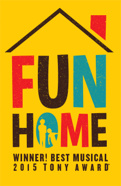Fun Home Scribe Lisa Kron on the 'Slightly Questionable' Act of Writing About Real People & Her Quest Not to Be Invisible

Lisa Kron is an acclaimed writer and a performer. Her plays include The Ver**zon Play, In The Wake, 2.5 Minute Ride and the autobiographical Well, in which she played (a version) of herself and was nominated for a 2006 Best Actress in a Play Tony Award. Kron is currently represented on Broadway by the much acclaimed Fun Home, for which she wrote the book and lyrics with Jeanine Tesori composing the score. The piece, based on Alison Bechdel’s graphic memoir, is nominated for 12 Tony Awards. Kron recently invited Broadway.com into her sun-filled, book-lined Brooklyn apartment to talk about the new musical and more.
What time of day do you get your best work done?
My favorite way to write is when I’m in a workshop with actors: I get up super early, write for several hours, take a shower, go to rehearsal, rehearse with those pages, and then meet with the creative team and talk about what we learned during the day. Then I come home, totally check out, watch a bunch of TV on my computer for a little while, go to bed early and then get up again really early. I love that—it’s the most productive thing. If I’m not in a workshop, it’s a less flattering process: I have a ritual with my newspaper and tea and then at some point—depending on how pressing the deadline is—I’ll start to write.
What essential items do you like to have on hand when you write?
Peppermint patties, tea, seltzer, my MacBook. If I get stuck then I’ll write longhand for while. The other thing I do when I get stuck is set a timer. Workshops and deadlines are really good for me because otherwise I get mired in minutia.
What theatrical experience changed your life?

What’s the hardest thing about writing characters that are real people?
There’s something slightly indefensible about writing about other people who are alive. It’s a mercenary thing to do. I think writers do it because they believe they have an imperative that’s greater than the imperative to let people control their own image, and whether that’s legitimate or not I can’t really say—I think it’s slightly questionable. But in this case, we were adapting Alison’s book; we weren’t adapting her life. Our loyalty was to the work of art that she had created and to try to reimagine that in this other form.

What surprised you most about writing your first musical?
I don’t know if it surprised me, but it was very difficult to figure out the difference between dialogue and lyrics. Jeanine was the greatest guide into that; she was very patient. I mean I knew this. People talk about it. Sondheim certainly has written about it: the way that lyrics are spare and they leave room for the music to do this other thing. But the actual experience of it was surprising and so gratifying. I think you have to love collaboration to be in the theater—you can’t make it by yourself, and making theater songs with someone is a profoundly satisfying type of theatrical collaboration.
What writers inspire you?

What’s the nitty gritty hard work of being a writer that no one ever told you?
It’s always uncomfortable, and it never stops being uncomfortable.
Is there anything that that Alison Bechdel said to you about Fun Home that particularly stayed with you?
Her relationship to this piece and to everyone who’s made it is really great and special. It was scary to send her work. I sent her an email that said, “Before you listen to it, I want to remind you—I know that you know this, but I want to remind you—that there are a lot of inventions and there are a lot of conflations in this work. We have had to change a lot of things and make up a lot of things.” And she said, “Thank you for reminding me, it’s good to be prepared for that.” And then she responded by sending me and Jeanine a dozen roses. She said “I don’t know how you did it, but even the things you made up feel like they were true.” When we were recording the cast album, I was watching her watch Sydney singing. I said, “When you watch that, do you feel like that’s you?” And she said “Yeah.” It was really wild because that’s all made up.

This piece has Alison, Medium Alison and Small Alison. What were Medium Lisa and Small Lisa like?
I was consciously waiting to be an adult. I was someone who was a mini adult trapped in a child’s body waiting to be set free. I was painfully shy as a kid. Whatever that currency is that makes a girl—and certainly in the ‘60s and ‘70s—noticeable in the world, I didn’t have it. I think it pissed me off to be invisible in that way and I was determined to make myself visible. I think I did that by very consciously developing a sense of humor. And then it started to become clear—particularly for a girl—there’s a fine line between being funny and being obnoxious. I made a sort of study of that. So I think that was something I was very interested in: being successfully funny and to not be invisible.
What’s your advice to aspiring writers?
I don’t really know what advice to give people except show up on time, do your work, make yourself pleasant to be around and listen to what other people are saying. You don’t have to agree with them, but listen to them. Go towards the thing that feels like it has heat around it, even if you can’t quite understand it. Just go towards that thing! See what’s going on.
What’s your favorite line in Fun Home?

